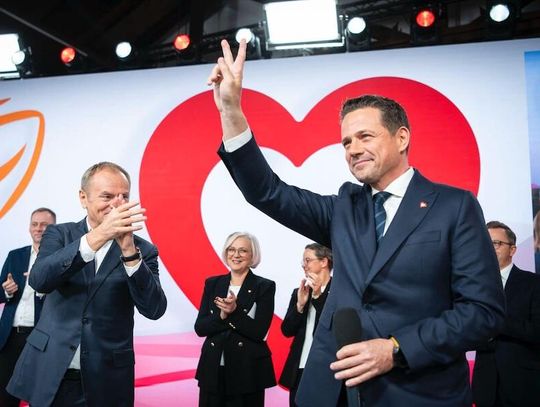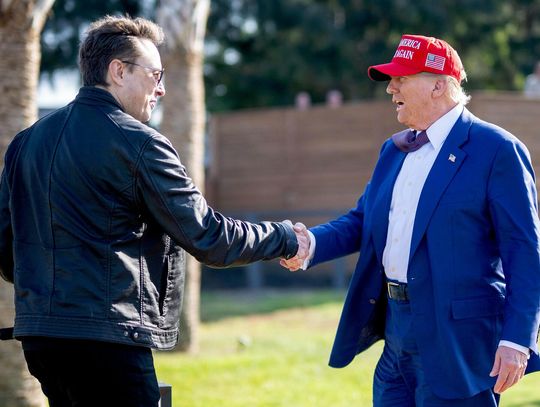The Warsaw Institute Foundation to pierwszy polski geopolityczny think tank w Stanach Zjednoczonych. Strategicznym celem tej organizacji jest wzmocnienie polskich interesów w USA przy jednoczesnym wspieraniu unikalnego sojuszu między dwoma narodami. Jej działalność koncentruje się na takich zagadnieniach jak geopolityka, porządek międzynarodowy, polityka historyczna, energetyka i bezpieczeństwo militarne. The Warsaw Institute Foundation została założona w 2018 roku i jest niezależną organizacją non-profit, inspirowaną bliźniaczą organizacją działającą w Polsce – Warsaw Institute. The Warsaw Institute Foundation is Poland's first geopolitical think tank in the United States. The strategic goal of this organisation is to bolster Polish interests in the U.S. while supporting the unique alliance between the two nations. Its activity focuses on such issues as geopolitics, international order, historical policy, energy, and military security. Established in 2018, The Warsaw Institute Foundation is an independent, non-profit organization inspired the twin Poland-based Warsaw Institute.
Sojusznicze wobec Rosji państwa – Białoruś, Armenia, a ostatnio także Kirgistan – domagają się od Moskwy obniżek cen gazu. Tego typu żądania są formułowane w Mińsku czy w Erywaniu już od dłuższego czasu, jednak obecnie, w obliczu załamania rynków gazowych w Europie (i nie tylko), dodatkowo nabierają one na sile. Mimo to nic nie wskazuje na to, by Rosjanie mieli pójść na ustępstwa. A na pewno nie za darmo.
O kwestii dostaw rosyjskiego gazu do państw Eurazjatyckiej Unii Gospodarczej (EUG) stało się głośno w ostatnich miesiącach, kiedy to armeński premier Nikol Paszinjan i białoruski prezydent Alaksandr Łukaszenka zdecydowali się współpracować w celu uzyskania od Moskwy zgody na obniżkę cen surowca. Co więcej, bardziej wnikliwi obserwatorzy mogli też odnotować, że z czasem do Armenii i Białorusi dołączył również Kirgistan. Tym samym, w chwili obecnej wszyscy członkowie EUG, którzy importują rosyjski gaz (do Unii należy jeszcze Kazachstan, ten jednak jest akurat eksporterem „błękitnego paliwa”), domagają się od Rosjan zmiany warunków współpracy. Skąd taka sytuacja, skoro mówimy wszak o państwach sojuszniczych (czy to z wyboru, czy z przymusu) względem Kremla?
W pierwszej kolejności należy zrozumieć, jak wyglądają realia dostaw gazu w EUG. Zarówno w przypadku Armenii, Białorusi, jak i Kirgistanu, Rosjanie pozostają pełnymi monopolistami, kontrolując infrastrukturę przesyłową oraz pozostając jednocześnie dominującym (lub wręcz jedynym) dystrybutorem surowca. Obecna sytuacja nie ma więc nic wspólnego z zasadami wolnego rynku. Rosyjski Gazprom z jednej strony sprzedaje gaz do Armenii, Białorusi i Kirgistanu, zaś z drugiej strony jego lokalne spółki-córki są formalnymi nabywcami tegoż surowca i jego dalszymi dystrybutorami. W praktyce oznacza to, że ceny gazu dla sojuszników Rosji są ustalane politycznie, stanowiąc często przedmiot szerzej rozumianych targów. Sytuacja ta jest szczególnie dobrze widoczna w przypadku Białorusi, gdzie rozmowy nt. warunków współpracy energetycznej są regularnie łączone z negocjacjami nt. ogólnych zasad dalszej integracji rosyjsko-białoruskiej.
Choć relacje Rosji z jej sojusznikami bywają szorstkie i trudne, co do zasady Kreml zapewniał jednak dotychczas względnie korzystne warunki importu gazu dla swoich partnerów. Nie licząc okresowych kryzysów, gdy dostawy „błękitnego paliwa” służyły Rosjanom jako przysłowiowy kij w negocjacjach, państwa EUG z reguły mogły liczyć na znaczące obniżki względem np. cen w Europie. Sytuacja ta zmieniła się jednak diametralnie w ostatnich miesiącach, wraz z bezprecedensowym załamaniem się rynków gazowych (nadpodaż surowca w magazynach po bardzo ciepłej zimie przy jednoczesnym wybuchu pandemii COVID-19).
Obecnie „cena na granicy” (tj. cena po jakiej spółki-córki Gazpromu kupują rosyjski surowiec) to odpowiednio 127 USD/1000 m3 w przypadku Białorusi i 165 USD/1000 m3 w przypadku Armenii i Kirgistanu. Jest to wielokrotnie więcej, niż płaci się aktualnie za gaz ziemny w Zachodniej Europie – według stanu na koniec maja 2020 r. cena surowca w holenderskim hubie TTF to zaledwie… 40 USD/1000 m3. Tak znacząca dysproporcja nie ma przy tym przełożenia na warunki dostaw w ramach EUG. Cena surowca w przypadku Armenii, Białorusi czy Kirgistanu ma sztywny charakter i nie jest powiązana ani z cenami rynkowymi, ani z kursem ropy naftowej.
Czy zatem rosyjscy sojusznicy mają szanse na korzystniejsze warunki importu gazu w kolejnych miesiącach? Na chwilę obecną wydaje się, że raczej niekoniecznie. Zwłaszcza, że także sam rosyjski Gazprom mierzy się z poważnymi problemami biznesowymi (niskie ceny surowców, utrudnienia w realizacji projektu Nord Stream 2 itd.) i tym bardziej może być niechętny do udzielania dodatkowych zniżek na sprzedawany przez siebie gaz.
Jeżeli miałoby dochodzić do jakichkolwiek ustępstw ze strony Rosjan, będą one miały ograniczony i raczej krótkotrwały charakter, obowiązując np. jedynie przez kilka miesięcy. Co więcej, można podejrzewać, że ewentualne zniżki musiałyby być też wówczas elementem większej całości, będąc np. powiązanymi z koncesjami politycznymi czy biznesowymi ze strony Białorusi, Armenii czy Kirgistanu.
Zdecydowanie nieprawdopodobnym jest natomiast, by Kreml miał pójść na rękę swoim sojusznikom w kwestii zasadniczej, tj. zgodzić się na ogólnie rozumianą rewizję systemu kształtowania cen gazu w ramach Eurazjatyckiej Unii Gospodarczej. Zarówno Armenia, jak i Białoruś domagają się, by na obszarze całej EUG ustalone zostały jednolite taryfy przesyłowe, co w praktyce uniemożliwiałoby Rosjanom zupełnie arbitralne ustalanie cen surowca dla swoich sojuszników. Erywań i Mińsk argumentują przy tym, że tego typu zadanie wynika wprost z przyjętego wcześniej celu utworzenia wspólnego rynku gazu do 2025 roku. Sęk w tym jednak, że inną optykę prezentują władze na Kremlu.
W maju głos w sprawie zabrał zresztą sam Władimir Putin, jednoznacznie odrzucając możliwość przyjęcia argumentów Armenii i Białorusi na obecnym etapie. Jak zaznaczył rosyjski prezydent, ujednolicenie taryf przesyłowych będzie mogło nastąpić dopiero wówczas, kiedy w EUG wprowadzony zostanie także… wspólny budżet oraz wspólny system podatkowy. Na dziś ciężko chyba o czytelniejszy sygnał, jakie jest stanowisko Kremla ws. współpracy gazowej ze swoimi sojusznikami.
Mateusz Kubiak
absolwent Studiów Wschodnich i Stosunków Międzynarodowych na Uniwersytecie Warszawskim. Pracuje jako analityk sektora energetycznego, zajmuje się również zawodowo regionem Kaukazu i Azji Centralnej.
The Warsaw Institute Foundation to pierwszy polski geopolityczny think tank w Stanach Zjednoczonych. Strategicznym celem tej organizacji jest wzmocnienie polskich interesów w USA przy jednoczesnym wspieraniu unikalnego sojuszu między dwoma narodami. Jej działalność koncentruje się na takich zagadnieniach jak geopolityka, porządek międzynarodowy, polityka historyczna, energetyka i bezpieczeństwo militarne. The Warsaw Institute Foundation została założona w 2018 roku i jest niezależną organizacją non-profit, inspirowaną bliźniaczą organizacją działającą w Polsce – Warsaw Institute. The Warsaw Institute Foundation is Poland's first geopolitical think tank in the United States. The strategic goal of this organisation is to bolster Polish interests in the U.S. while supporting the unique alliance between the two nations. Its activity focuses on such issues as geopolitics, international order, historical policy, energy, and military security. Established in 2018, The Warsaw Institute Foundation is an independent, non-profit organization inspired the twin Poland-based Warsaw Institute.
The Warsaw Institute Foundation to pierwszy polski geopolityczny think tank w Stanach Zjednoczonych. Strategicznym celem tej organizacji jest wzmocnienie polskich interesów w USA przy jednoczesnym wspieraniu unikalnego sojuszu między dwoma narodami. Jej działalność koncentruje się na takich zagadnieniach jak geopolityka, porządek międzynarodowy, polityka historyczna, energetyka i bezpieczeństwo militarne. The Warsaw Institute Foundation została założona w 2018 roku i jest niezależną organizacją non-profit, inspirowaną bliźniaczą organizacją działającą w Polsce – Warsaw Institute. The Warsaw Institute Foundation is Poland's first geopolitical think tank in the United States. The strategic goal of this organisation is to bolster Polish interests in the U.S. while supporting the unique alliance between the two nations. Its activity focuses on such issues as geopolitics, international order, historical policy, energy, and military security. Established in 2018, The Warsaw Institute Foundation is an independent, non-profit organization inspired the twin Poland-based Warsaw Institute.
Reklama











